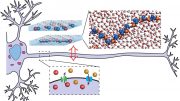
Researchers at the University of Nottingham have discovered the key role of dirigent proteins in plant roots, which regulate water and nutrient uptake by controlling the lignin barrier in the endodermis. The finding has significant implications for developing drought-resistant crops that require fewer resources. The researchers also highlighted the importance of this discovery in adapting agriculture to changing climate conditions and ensuring future food security.
Researchers have identified a protein that acts as a sealant for plant roots, controlling the absorption of nutrients and water from the soil. This breakthrough could lead to the development of crops that are resilient to climate change, needing less water and fewer chemical fertilizers.
Researchers from the University of Nottingham identified new components of the lignin barrier in plant roots and the specific function of dirigent proteins (DPs), located in the root endodermis that control water and nutrient uptake. Their findings have been published in Science.
Root Function and Endodermis
Plant roots function by absorbing mineral nutrients and water from the soil and also controlling their proper balance in the plant. This control is exerted by a specialized layer of root tissue called the endodermis.
The endodermis contains a barrier to the movement of solutes and water that is made of lignin, the same material present in wood. This impermeable barrier blocks the uncontrolled movement of material into the root, by forming a tight seal between cells. This seal ensures the only pathway for nutrients and water to be taken up by roots is through the cells of the endodermis. This allows full cellular control over what enters and leaves the plant via the roots.
Role of Dirigent Proteins
This research has identified new components of the lignin deposition machinery that focus on the function of dirigent proteins (DPs), located in the root endodermis. These proteins act in coordination with other described root regulatory components to direct and organize the correct deposition of lignin in the endodermis allowing the plant to ensure it receives the optimum balance of nutrients from the soil.
Dr Gabriel Castrillo from the University of Nottingham’s School of Biosciences one of the leaders of the research, said: “With record temperatures being reached in parts of the world this year and erratic rainfall it is ever more important to understand the mechanisms of plants so we can future proof them to secure future food supplies. This research shows how plant roots regulate their uptake of water and nutrients through the deposition of lignin, which is regulated by DPs. Without these proteins, proper root sealing is not completed and the nutrient balance in the plant is compromised. We can use this knowledge to engineer plants to be able to grow with less water and chemical fertilizers.”
Reference: “A dirigent protein complex directs lignin polymerization and assembly of the root diffusion barrier” by Yi-Qun Gao, Jin-Quan Huang, Guilhem Reyt, Tao Song, Ashley Love, David Tiemessen, Pei-Ying Xue, Wen-Kai Wu, Michael W. George, Xiao-Ya Chen, Dai-Yin Chao, Gabriel Castrillo and David E. Salt, 26 October 2023, Science.
DOI: 10.1126/science.adi5032









Be the first to comment on "New Discovery Seals Future of Climate-Proof Plants"